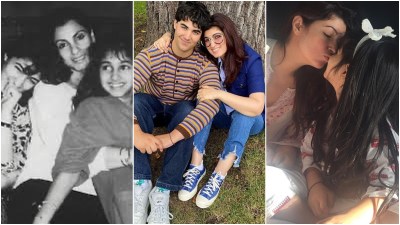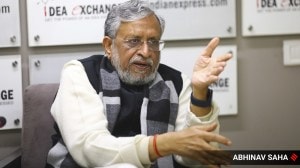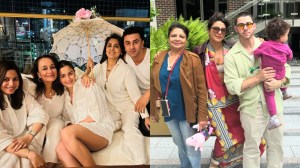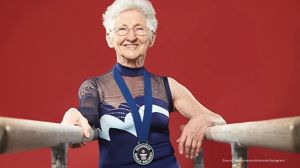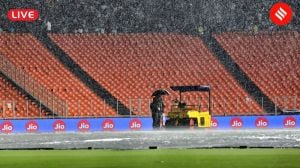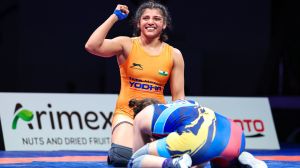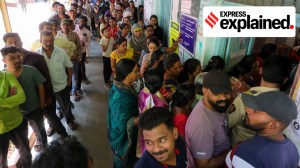- India
- International
Riddhi & Siddhi — twins living in Mumbai hospital ward, all but abandoned by their parents
This Diwali, the toddlers mark a major milestone — they are headed for school.
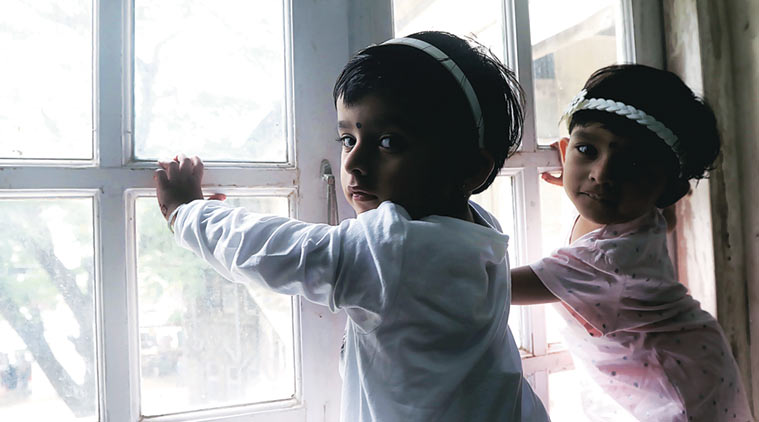 Staff at the hospital say the twins love to dress up and have several hair bands, bangles and shoes. (Express Photo by Pradip Das)
Staff at the hospital say the twins love to dress up and have several hair bands, bangles and shoes. (Express Photo by Pradip Das)
On a high wooden desk at CEO Dr Minnie Bodhanwala’s office sits a bowl of chocolates. Two three-year-olds stretch to reach the bowl but fall short, only for Bodhanwala to offer them a helping hand. For Riddhi and Siddhi, it’s a familiar routine at their favourite spot at the Bai Jerbai Wadia Hospital for children in central Mumbai, where they have been living for the past three years.
Home for the three-year-old twins is a colourful cubicle at the far end of Ward 21 — or ‘Bear’ (the wards here are named after various animals) — which houses infants who have just undergone surgery and their anxious parents.
For Riddhi and Siddhi though, whose parents last visited them a year and a half ago, for a day, all the hospital nurses and ayahs are “mumma”. The affection is mutual. Everyone, from the sweeper to the surgeon at this hospital in Parel, has an anecdote to share about the twins.
When the girls were first brought here, by the NGO Pratham, they were not just conjoined twins — a rare occurrence, with the odds of this happening pegged at one in 50,000 — but also ischiophagus tetrapus twins, who make up just five per cent of all conjoined twins. The ‘ischiophagus tetrapus’ condition meant that the babies had their urinary bladder and genitalia fused together and their legs, rather than being straight, protruded and dangled from the sides of their common abdomen.
Now the two are only the second known case in the country of both conjoined twins having survived post separation.
Hospital authorities say they have been getting calls from couples seeking to adopt the girls, but, asks CEO Dr Minnie Bodhanwala, “How can we separate them from each other? How can we do anything without their parents’ approval? We will have to locate the parents once all medical complications are resolved.”

One problem though has been resolved. After some running around by the authorities, Riddhi and Siddhi have secured admission at the BMC-run Poibawadi Hindi school in Parel, and they will join classes after Diwali.
Calling the school admission a “precious” step forward, NGO Pratham says they contacted the girls’ parents several times for their birth certificates, but could never meet them. “They kept saying they would come, but never did. Finally, we had to get an affidavit from court to facilitate their admission,” says Navnath Kamble, a counsellor with Pratham.
***
It was 3 am on May 6, 2013, when Shalu, then 26 and seven months pregnant, went into labour prematurely. Her mother-in-law, also the village midwife Shobha tai, was present with her in their one-room mud hut at Olawa village in rural Maharashtra’s Raigad district. Shobha was the first to realise something was wrong.
Shalu and husband Arun Pawar, then 29, already had a three-year-old daughter, Sonu, while another daughter had died shortly after birth. This time they wanted a boy.
Shobha expected a healthy baby, but the one that came out first was joined at the pelvis to another. Plus, they were girls, not what the family had hoped for.
“We did not know something like this was even possible,” says Arun, now 32 and a migrant worker.
According to Pratham, by the time a three-member team landed at Olawa village the next day, following a tip-off from a local villager, the girls had become a spectacle. “They were lying on a cot with a bowl nearby. People were throwing money just to see them,” says Kamble, who was part of that Pratham team.
The Pawars, who refuse to talk about the events following the birth, reportedly made it clear that they didn’t want the babies.
Pratham brought the girls to Wadia Hospital in Parel, a semi-government hospital. CEO Bodhanwala says she remembers the day clearly. “The babies were brought to our out-patient department. Our surgeon was excited to take up the case. She came to me and said the parents are poor and could not afford the medical cost. ‘Can we still admit the children?’ she asked. We decided to support our doctors,” Bodhanwala says.
On May 10, 2013, doctors conducted a three-hour surgery to control the sepsis that had spread as a result of the twins urinating and defecating from the fused vagina. The surgeons created a separate orifice for urine and stool movement near the common naval area both shared.
A six-month-long wait ensued as the girls together weighed just 2.6 kg; they needed to be at least 5 kg each for future operations. “Their pelvis and uterus were completely fused and we didn’t know at that point whether a separation surgery would be possible. Very few survive the separation surgery,” paediatric surgeon Dr Pradnya Bendre says.
On January 17, 2014, the Olawa twins joined that exclusive club, after a successful six-hour-long surgery.
The hospital’s superintendent, Dr Ashwini Jogade, and the CEO named the older sister Riddhi and the younger Siddhi. By then, a corner of Ward 21 had already been converted into a tiny room with two cots for the babies. In May 2014, in time for their first birthday, it got an upgrade — an air-conditioner and gifts from doctors and nurses.
Over time, the room would get filled up with toys, especially Riddhi and Siddhi’s favourite Barbie dolls, a twin pram and new clothes.
Riddhi and Siddhi’s parents didn’t come for the birthday celebrations. Mother Shalu was pregnant, hoping for a son. Again, a daughter was born.
“A boy will help earn for the family,” says father Arun, employed as a road contract labourer on the Pune-Aurangabad highway. Last year, a son was finally born to the family. The toddler, who is yet to be named, travels with Arun and Shalu as they migrate from one city to another in search of work. Their two daughters, six-year-old Sonu and two-year-old Ritu, live with Arun’s younger brother Aadesh, 24, and mother Shobha in Chintapur village, some 800 km away.
As he talks to The Sunday Express on phone, Arun says, “I am ready to take Riddhi and Siddhi back, but who will pay for their medical expenses?”
He earns Rs 5,000 a month and lives in a shanty by the road. He says it costs him around Rs 3,000 to travel to Mumbai to see his daughters, which he cannot afford. Since the twins were admitted to hospital, the family has visited them less than half a dozen times.
In Chintapur, Arun’s mother Shobha enquires if Riddhi and Siddhi can talk. “Can they say aayi (mother)?” she asks. A moment later she wants to know, “Will the government or hospital give us money if we bring them back?”
***
It’s 4 pm. Ayah Manisha Kharadmal, 28, has been assigned the 2-10 pm shift to look after the twins. She is filling in for full-time caretaker Shobha Gaikar, 52, appointed by Pratham to look after the girls but who is on a 10-day leave.
In the cubicle, seated amidst a colourful plastic cupboard, two doll houses mounted high on a parapet, several dolls, a twin baby-stroller and a television set, Kharadmal pulls out a large syringe filled with formula milk from a sanitised container and gives it to the twins. It is a habit from their early days, when the nurses would use syringes filled with formula milk to feed the two babies. Riddhi and Siddhi are fed milk three-four times a day, apart from their regular meals.
The girls, still sleepy from their afternoon nap, lazily push away the syringe handle, their eyelashes fluttering open slowly. A slow, naughty smile appears on the face of Siddhi, the leaner of the two, as she softly punches Riddhi to wake her up. “I love these girls more than my child,” smiles Kharadmal, who has a 10-year-old son.
Kharadmal is extra cautious while changing their diapers. Riddhi lets out a cry every time her diaper is changed or she has to urinate as the skin in that region is still sore. Siddhi, the more playful of the two, stops mid-way, looking at her sister in concern.
It is one of the complications the doctors fear the girls may end up living with for the rest of their lives. Both Riddhi and Siddhi have deficient musculature — the muscles around their anal and pelvic region cannot be reconstructed and, as a result, it deprives them control over their bowel movements. “They will always have to wear diapers,” says paediatric surgeon Bendre.
But doctors are not giving up hope. The hospital has contacted a surgeon couple in the United States, who specialise in anorectal malformation. “We have reached out to them. They may know how to help reconstruct the anal area for these girls,” Bendre says.
Other medical complications persist too. According to hospital superintendent Dr Ashwini Jogade, the twins have already undergone three major surgeries — one to create a separate orifice for urine, a separation procedure, and a re-correction surgery to align their legs. “Their legs still protrude outwards from the hip bone at an angle, unlike ours, which are straight down,” Jogade says.
Watching them balance themselves on those shaky legs, however, is a sight that lifts the hospital’s spirits every time. “They easily make friends with other patients in the ward. Once, a 10-year-old boy was admitted for two months. They would play with him every day and call him dada. After he was discharged, they would look for him. But they are young; they forget easily,” Kharadmal says.
Staffers talk excitedly about how the twins have learnt to operate a TV remote with ease, and can play games on any mobile handset without assistance. The girls also adapt very well to new caretakers, including temporary ayahs such as Kharadmal, even reminding them when it’s time for their milk or their daily stroll.
But they reserve the most affectionate “mumma” cry for Gaikar, who washes their clothes, bathes them and ensures they attend their exercise sessions on time. “I live with them day and night. Once their mother stopped coming to meet them after her last pregnancy, I started doing their chores. Before that, she stayed here briefly and helped around,” Gaikar says.
Gaikar has two daughters living outside Mumbai in Nallasopara, but she seldom visits them, except for 10 days every year during Ganpati celebrations. “I am so used to Riddhi and Siddhi that I can’t leave them for long. I start missing them,” she laughs.
Gaikar receives Rs 1,200 a month and food from the hospital for looking after the twins. The money, she says, doesn’t matter any more.
***
As the girls wear their disco-light shoes, a gift from a doctor, and sit in the pram for their evening round of the hospital, a nurse pats their heads on their way out and so does ward boy Anand Sawant, who they greet in the corridor. Lift-man Sujit Gupta gets a wink from Siddhi.
Nurse Mrunalini More, 26, has no children of her own. “For me, they are my daughters,” she says.
Paediatric ward in-charge Sangamna Fernandes, who has seen the twins since they were first brought here in 2013, says she loves to teach them alphabets. “Siddhi has learnt to write A and B but Riddhi just draws circles on paper,” Fernandes says as she holds up a tiny notepad.
While the twins address all women nurses and doctors as “mumma”, “papa” is only for Dr Amol Nage. “My shift starts with a round to their room and ends with them,” Nage smiles. He was part of the team that separated the twins and is now involved in their regular care. “They call me papa, but my own son calls me kaka because he rarely sees me,” Nage laughs.
The twins attend an hour-long session of occupational and speech therapy every morning. They mutter in Marathi to each other, fighting only over Barbie dolls. In the afternoons, they return to their room to sleep and by evening, are out again, mostly dashing to the CEO’s office to watch cartoons on her laptop or to play games on mobile phones.
Bodhanwala says the hospital spent over Rs 20 lakh, with help from donors, in the first year of the twins’ treatment, but after that, it has stopped keeping tab.
“We are not worried about them not getting adopted,” says the CEO. “Time will come when they may have to move out of here, but not now.”
May 13: Latest News
- 01
- 02
- 03
- 04
- 05











